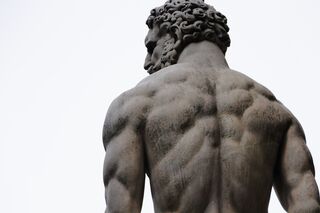President Donald Trump
Does Trump Represent Modern Masculinity?
Susan Faludi discussed Mr. Trump’s modern masculinity.
Posted November 25, 2020 Reviewed by Jessica Schrader

In a recent article by Susan Faludi in the New York Times, she has discussed Mr. Trump’s "Thoroughly Modern Masculinity." She argued that the president isn’t a throwback to old-school masculinity. Instead, he’s a he-man specifically engineered for our image-based, sensation-saturated times. I have founded an organization with the aim of defining what modern masculinity is and have a somewhat different viewpoint on the subject.
First, what are masculinity and femininity?
According to Carl Gustav Jung, the human psyche is an androgynous entity regardless of what the gender of the physical person is. The psyche contains and embraces both the feminine and masculine and he called them the Animus and Anima. He also believed that in the collective unconscious we all carry archetypes, which exist as “Universal Ideas” that are common to all of mankind.
As argued before, this means that we each carry images of masculinity and femininity in our collective conscious and unconscious mind from the movies we saw, the artworks we have seen, the stories we have heard from our parents and grandparents. There is no way to ignore all that, even if we disagree or agree with how masculinity is portrayed around us in society. Some will say that these are just stereotypes and they are no longer useful for us going forward. Still, it is observable that people around the world respond to certain images and characters very strongly.
All movie directors, screenwriters, and actresses know that. We are all familiar with the image of the hero and our heart starts beating faster as we watch Finn’s character development in Star Wars. We resonate with the archetype of mother and the lover when we sympathize with Alicia Florrick from The Good Wife. Dumbledore from Harry Potter seems like a good old familiar figure from the neighborhood as we resonate with the universal image of the magician. And let’s not forget the jester, or as previously known prior to the movie Batman, the joker. You know, the Shakespearean character, our friend Tyrion Lannister from the Game of Thrones?
So, when we resonate with any kind of masculinity we see, it is because it appeals to one of those archetypal images that are deeply ingrained in our collective subconscious.
And why are we attracted to machismo and authoritarian masculinity?
Because we strive to be more comfortable. A belief system is a comfort zone on its own and most of us have a very bad relationship with uncertainty. Our sense of security depends on external factors. We need a set of strong rules and a strong authority that tells us what to do.
For example, one of my clients who is a CFO in a big organization is telling me that he cannot let his direct reports feel too safe around him, because they will stab him in the back sooner or later. Previous to our coaching session, one of his most trusted managers told me that she is so afraid of his unpredictability that she cannot sleep for nights now and is considering leaving the company, even though she really appreciates him as a professional and would like to do her best for him. Two very different maps of reality, right?
So why do people still turn to various forms of extremism that all claim to own the “one and only truth”? Or with respect to the much-discussed QAnon phenomena, why do people believe even for a second that the world may be in the hands of a pedophile international mafia? And in general, why are men more susceptible to extremism than women?
The definition of extremism is much broader than we think. It is simply when you believe that your beliefs/map is the only right and true map of reality. The more you believe your own absolute truth, the more ready you are to act in the name of it. Why does low turnout generally favor the more extreme views? Because the extremely committed voter will always vote. For most of us men, there is a fundamental problem with the notion that the map is not the territory. This means we are not safe anymore.
It is uncomfortable to know that there is no ultimate truth and we need to listen to each other and co-create solutions. Hence, another "solution" emerges, and we look for simple (political) messages, big promises, and a person with strong charisma/spiritual or political authority, who is going to make us great and safe again. This explains the surge of authoritarian, paternalistic politicians around the world, from Russia to Hungary, from Poland to Brazil or the US. I must also add that this phenomenon of the "one and only right map" appears on both ends of the political spectrum and it is fueled by the artificial division created by partisanship. The so-called post-modern or Neo-Marxist movements are often just as dogmatic and unwilling to engage in open discussion as the Alt-right circles.
I would argue there is nothing new and modern about the masculinity Mr. Trump represents. It is the same old machismo that appeals to our need for more safety and a paternal figure who is smart enough to figure things out for us.
What is modern masculinity?
As for defining modern masculinity, I would go back to the archetypes mentioned at the beginning. I would argue that the ingredients don’t need to change but the right mix and application has to be applicable to our times. Modern masculinity calls for great flexibility but also resolve with purpose. It is a new normal of bringing together elements that may look contradictory on the surface. It is about intimately knowing the four archetypes and what they represent and intentionally using them in the right mix at the right time. It is the ability to:
- Be a hero, take risks, face adversity and make bold decisions on time;
- Be a "lover”; in being able to listen and notice emotions of others and express our own; to have empathy and capacity for vulnerability, like our racial problems and COVID-19;
- Be a jester; to be able to ease tension and have the necessary playfulness and flexibility to find new solutions and ideas versus mockery or judging and smearing;
- Be the magician, in being able to hold multiple contradicting points of view and transform obstacles such as conflicts that initially appear unsolvable (like much of our problems now).
The new modern is a true mix of what was traditionally considered as the masculine and feminine components of the personality. Instead of ignoring biological differences and Yin and Yang, this approach gets practical about how we want to show up and what culture we want to belong to. This way, everyone, no matter if they identify as men or women, can decide how to relate better to others and build a culture of open conversations. This is why any president leading America after this election should unite rather than divide and use all that’s available between masculinity and femininity to create a new blend of union.




